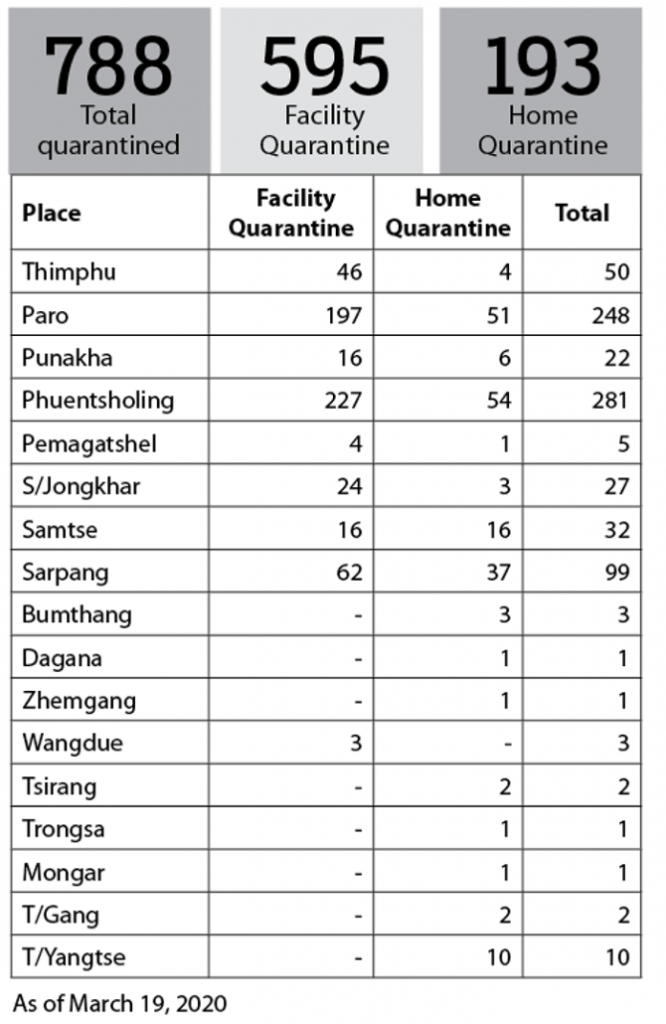March 21, 2020
Government will maintain the status quo on its preparedness plans and strategies
The ‘extra’ precaution Bhutan has taken in handling the Covid-19 situation has proven to be practical in detecting the country’s second positive case yesterday.
The partner of the 76-year-old index case (patient zero) who was air evacuated to the USA on March 13, tested positive for the new coronavirus on the fourth test conducted on March 19.

The 59-year-old partner, along with the tour guide and the driver who were the primary contacts of the 76-year-old American patient were scheduled to leave the quarantine facility yesterday, after completing the 14 days quarantine period.
The driver and guide tested negative for the virus.
As per the World Health Organsiation’s (WHO) guidelines, a suspect is tested and retested only upon becoming symptomatic during the 14-day incubation period. However, irrespective of the symptoms, the health ministry conducted at least three tests so far on all the suspects under quarantine. A total of 400 tests have been conduced so far with 40 tests in the last 24 hours.
Given the international shortage of testing kits, Covid-19 testing elsewhere costs more than USD 3,000, whereas, in Bhutan it is provided for free.
Nothing changes for Bhutan
Prime Minister Dr Lotay Tshering during a press briefing yesterday said that the detection of second positive case in the country doesn’t bring in any changes to the government’s strategies and preparedness plan for now.
Following the detection of the first Covid-19 case in the country on March 5, all primary contacts of the patient zero, which is also the same for the 59-year-old partner, were traced within the first eight hours and put under quarantine.
Save for the partner, none of the others have tested positive to the virus so far.
No threat from second case
Lyonchhen said that the threat from the partner is negligible and there is no need for the public to panic. He said that the patient is asymptomatic for now and has been moved to the isolation.
“The biggest threat for now should be the deteriorating situation across the world and increasing number of positive cases being detecting in the nearby regions.”
India recorded at least 50 news cases as of 9 PM yesterday, the highest in a single day since the outbreak weeks ago.
While there are no separate plans designed to treat the patient, Lyonchhen said that medical staffs would be deployed as it was done for the first patient and as and when the partner shows any symptoms, she would be treated for it.
“Unless she recovers and tests negative to the virus, it is our responsibility to ensure her safety,” the Prime Minister added.
It was also decided that the guide and driver would have to continue to stay at the quarantine facility in Mothithang, Thimphu. “While they have tested negative and are doing well, their quarantine is being sustained, subsequent to the second positive case detected in the partner,” according to officials from the Prime Minister’s office.
The guide and driver had initially opted to leave the facility quarantine and practice self-quarantine at their respective homes following the completion of the 14-day incubation period yesterday.
Testing is highly sensitive
With people growing skeptic of the testing kit and procedures, Lyonchhen explained that the fact that the fourth test on the partner coming positive after three consecutive negative results, showed how sensitive the testing procedure was.
“No test is 100 percent specific but this test is highly sensitive. We test and retest samples when the results are negative but we do not do the same when we have a positive result. This is the nature of the test.”
Bhutan is using an internationally certified machine, polymerase chain reaction (PCR) to test sputum, blood and body fluids of suspected new coronavirus patients.
The PCR uses artificial intelligence to deliver results and human error is very minimal, according to Lyonchhen. The WHO supplies the reagents used in the testing.
Source: Kuensel